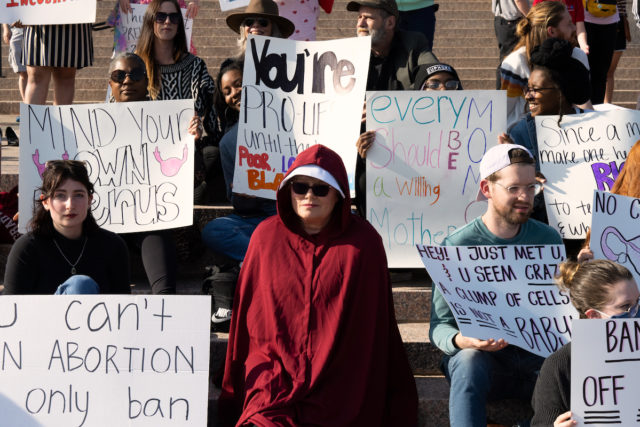

(Editor’s note: This article about abortion rights in Oklahoma includes details about rape.)
While America debates abortion rights on the state and national level, Debbie Brooks’ mind is full of dread and painful memories of an experience that ultimately led her to an abortion clinic in the mid 1980s.
She feels dread for what lies ahead as it appears the U.S. Supreme Court may be poised to overturn Roe v. Wade, leaving it almost entirely to the states to decide their own abortion laws. At least 26 states, including Oklahoma, have already passed strict laws. Last month, Gov. Kevin Stitt signed a law banning almost all abortions from the point of fertilization.
For those who have made the difficult decision to have an abortion in the past, the renewed fight over Oklahoma abortion rights has had a chilling effect.
“I think about young women a lot and what it means for them,” Brooks said. “They will lose the rights I had. They will lose that freedom, and a terrible moment in their life, when they are faced with choices no one would want to make, will be made more difficult. I’m just so sad we’re back to this point.”
Legislators at the Oklahoma State Capitol have passed a flurry of abortion related bills this session:
- SB 1503 prohibits abortion after cardiac activity can be detected in an embryo. In most cases, that is at six weeks. The bill also establishes a Texas-style bounty system that allows any citizen to sue anyone who provides or “aids and abets” an abortion;
- SB 1555 would trigger the reinstatement of a law passed in 1910 that completely bans abortion in Oklahoma without exception, should the Supreme Court overturn Roe vs. Wade;
- SB 612 prohibits a physician from performing an abortion unless the life of the mother is at risk, punishable by up to a $100,000 fine and 10 years in prison;
- HB 4327, the most recent measure, prohibits a physician from knowingly performing or inducing an abortion unless it is to save the life of the mother or the pregnancy is the result of “rape, sexual assault, or incest that has been reported to law enforcement.” The measure also specifies that the act will be enforced exclusively through private civil actions with certain requirements and specifies damages if a claimant prevails in a lawsuit.
While Brooks and others who share her point of view are horrified at the possible end of Roe, others see it as cause for celebration.
“We’ve been waiting almost 50 years,” said Rep. Wendi Stearman (R-Collinsville), who co-authored HB 4327. “So I think anyone who has supported pro-life legislation or who is anti-abortion is looking forward to seeing the end of Roe.”
‘A predator had tried to ruin my life to get his jollies’
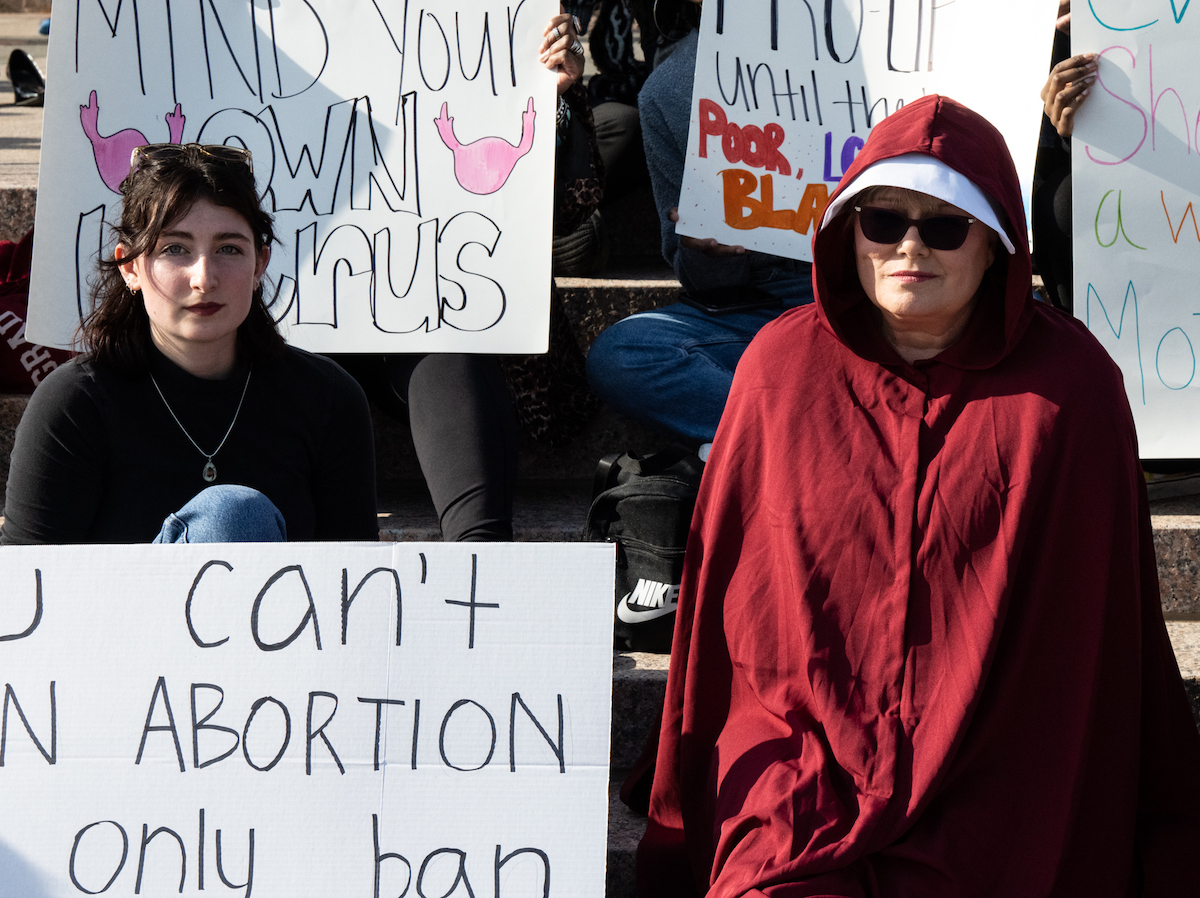
Newly divorced and in her mid 20s, Brooks was not interested in dating. Her job as a teacher provided focus, and working with kids was her passion. But late on New Year’s Eve 1984, her phone rang. On the other end of the line was a girlfriend. Together, they lamented being two single women in the prime of their lives sitting at home on the biggest party night of the year.
They decided to do something about it. Brooks and her friend got dressed up and made their way to a club in northwest Oklahoma City.
“Music videos were the rage, and this place had TVs and music,” Brooks said, recalling that evening. “They had advertised that they were going to show the new Thriller video at midnight while they served champagne.”
Their plan was far from elaborate. Just a quick hangout, a midnight toast and then some greasy food at Denny’s.
It didn’t work out that way. In the club, the women made their way to the bar, and it wasn’t long before two guys began talking to them. One asked Brooks to dance, and she agreed, leaving her drink unattended on the bar, with one of the men still there. She now wonders if that was the moment something could have been slipped into her drink.
The two men asked to join them for their late-night meal.
“One of the guys said that he’d drive her over and I could drive this other guy,” Brooks said. “You could see the restaurant from where I was parked. I didn’t see any danger.”
Before she made it out of the club, Brooks began to feel sick to her stomach, tired and disoriented.
“The next thing I know, I’m fighting for consciousness,” Brooks said. “I have no control of my gross motor functions.”
Not feeling well, Brooks asked to be taken to her home nearby. There, the man raped her. Two months later, Brooks, who had not been dating prior to that night for months, found out she was pregnant. Brooks had recently lost her father to cancer. Though her friends were supportive, she felt lost without her dad, the person that had been her rock.
“Keep in mind, I was a teacher,” Brooks said. “Back then, some unmarried teachers (who got pregnant) were forced out. There would be few chances of promotion, or a career. I’d have to move out of state, and, on top of it all, my entire support system had just died. I had nowhere to go if I wasn’t employed. No one to pay the bills. No one to save my career. No father to help. No child support to apply for. A predator had tried to ruin my life to get his jollies. I aborted the pregnancy. It was not really a choice.”
‘I would have been overjoyed to be pregnant’
The day of the abortion is seared into Brooks’ memory. She made the appointment and drove herself to the clinic, where a handful of protesters jeered at her.
“On shaky legs, I tried to will myself to walk, and I remember so well how I was trembling,” Brooks, now in her mid 60s, said. “Would someone from work find out? Would I be on a poster? Would they follow me when I left? All these thoughts were racing through my head. I was completely panicked.”
Brooks was given a mild sedative before the doctor entered her room.
“The doctor warned that I may feel some pressure as he performed the procedure,” Brooks said. “It only took a couple of minutes, not much different from a standard female exam. Then they took me to recovery.”
She experienced some pain and cramps afterward. Later that year, she was given an award for excellence and a promotion at work, but her problems were far from over. She experienced long-term reproductive issues, which she was told ran in her family. Those problems eventually would threaten her life. During that time, she had met a man she was crazy about, and they had hoped to start a family. But, despite numerous hopeful moments, Brooks never had children of her own.
“I would have been overjoyed to have been pregnant,” she said. “They tell you you are and then that light goes on and you think, ‘I’m pregnant,’ and it’s amazing. A light goes on. And then you realize not only are you not pregnant but there’s something wrong with your body and you might not be on this earth another day.”
Support for abortion access steady nationally
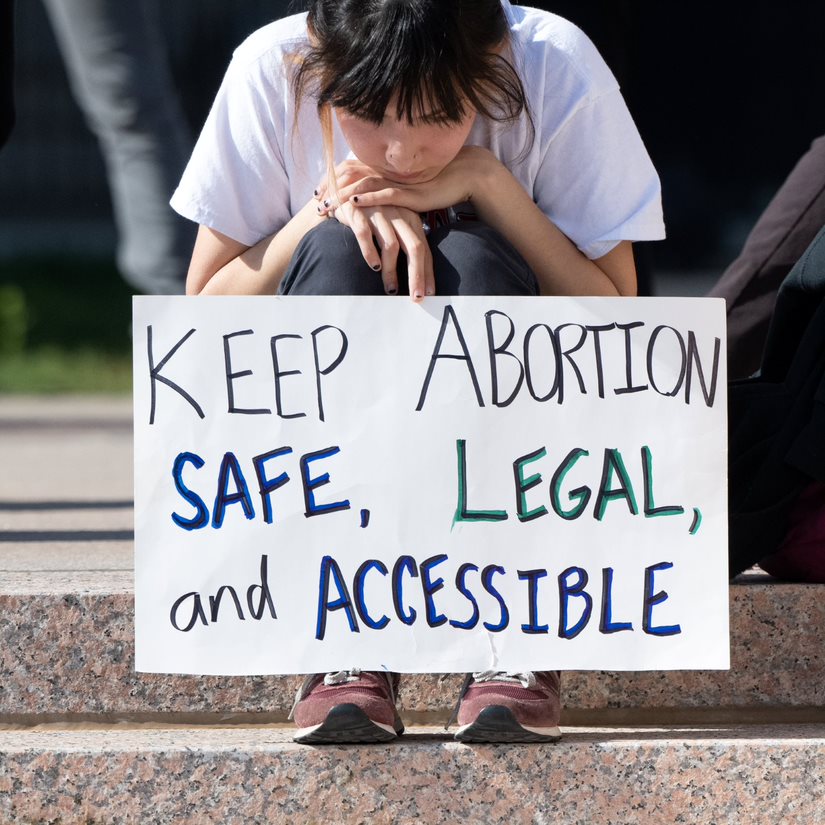
According to a poll by Amber Integrated, most Oklahomans don’t want a total abortion ban. In a December survey of 500 Oklahomans, only 31 percent said they wanted a complete ban on abortion, and 55 percent were against it.
Still, in his pledge to sign laws limiting abortion rights, Gov. Kevin Stitt has said he is delivering on what Oklahomans want.
“As governor, I represent all 4 million Oklahomans, and they overwhelmingly support protecting life in the state of Oklahoma,” Stitt said earlier this month.
Nationally, if the Supreme Court overturns Roe, it will be even more out of step with public opinion. According to a Pew Research Center poll, 61 percent of Americans support abortion remaining legal under any or most circumstances. That number has remained steady for more than two decades.
While the percentage of those favoring access to abortion has remained steady, the number of abortions performed in Oklahoma has been in decline. According to numbers from the Oklahoma State Department of health, there were 6,215 abortion performed in the state in 2002 and 3,665 in 2021, with a fairly steady decrease since 2006.
‘I believe in limited government, that the state should not be involved’
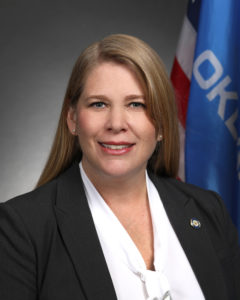
In the eyes of HB 4327 co-author Rep. Wendi Stearman, what might happen to a child born as the result of an unwanted pregnancy cannot justify ending the pregnancy.
“I don’t think we should base that decision on whether or not a child should live or not based on what their quality of life might be,” Stearman said. “While there is opportunity for it to be difficult, there is great opportunity for success.”
Stearman explained her perspective on the role of government.
“As far as what the state should do in that situation, I believe in limited government — that the state should not be involved,” she said. “My job as a representative is to defend life. Then that life needs to find a way to live on its own, without the aid of the state. There are lots of services already available.”
Stearman said the abortion limitations she has promoted do not amount to government overreach, even though they affect women’s ability to control their bodies.
“In this case, we are only defending that unborn life,” she said. “I am sorry that it is inside of a woman, however — I mean, I’m not sorry — but we are defending that life, so no, I don’t think that conflicts. That is still limited government. But, as far as services being provided, that is taking from one man and giving to another, so that is theft, and I don’t support that.”
Asked if the state should provide more funding for services to newborns and their mothers if they lack monetary resources, Stearman said that is not the role of government.
“I personally think we have too many (services), because, again, I don’t believe that’s the proper role of the state to provide for families,” she said. “I believe it’s the role of the state to defend life so that life can go on.”
Rep. Kevin McDugle (R-Broken Arrow) said abortion policy should ultimately be left to the states.
“I think it’s appropriate and necessary,” McDugle said of recent legislation cracking down on abortion rights. “It’s not the federal government’s job to set state laws like that. There’s nothing in the Constitution that gives them the right to do that. So, as far as Roe v. Wade, I think it’s better if the State of Oklahoma can set its own statute.”
McDugle also said his personal views differ somewhat.
“I personally believe it’s between God and a mother on these types of issues,” he said. “When bills come, up I’m always going to vote on the pro-life side of things, because there’s no blood on my hands in that sense. I want to make sure I always stand for life. From a biblical standpoint, I say no, but from a personal standpoint, I think that’s for a mother and God themselves.”
Rep. Garry Mize (R-Guthrie) said he believes it’s possible that some of the legislation goes too far.
“My untrained legal mind would say there is always the potential of going too far when you’re creating public policy,” he said. “If we aren’t talking to everyone that is involved in that discussion, talking about it holistically and not letting everyone have a voice, then I think yeah, I think there’s always the potential of going too far.”
Mize, debated against Stearman’s bill on the House floor, said it’s important to take into account what it might be like to be confronted with the decision of whether to get an abortion.
“I don’t think often enough we’re taking into account everybody’s situation up to the point of that decision and being willing to walk a mile in someone else’s shoes,” he said. “If we did that, I think we’d have better public policy.”
Oklahoma Department of Human Services director Justin Brown said he is pro-life, which is something he said is evidenced by the current DHS budget.
“Ultimately, I’m a firm believer in life as well, all lives,” he said. “I think that is what this budget priorities that we just laid out illustrate. I do think we have an opportunity in Oklahoma to move upstream from families living in poverty, regardless of who they are or where they live. We’re building a pooled human services distribution model that meets families where they are.”
Follow @NonDocMedia on:
‘This is not one more ban, it is not another ban, it is a first’
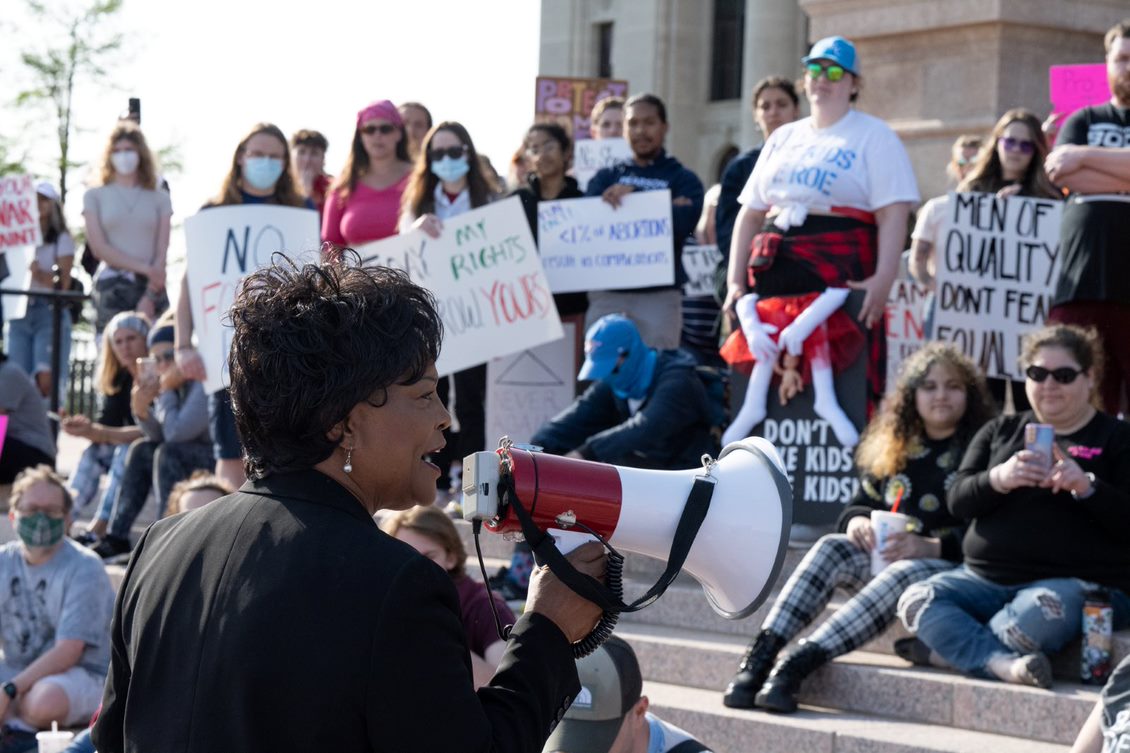
Tamya Cox-Toure has prepared for the current fight over abortion for as long as she can remember. Still, the executive director of ACLU Oklahoma finds herself mildly surprised that the United States is on the cusp of being to the right of Ireland on abortion.
That nation, steeped in Catholicism, had an abortion ban in place from 1861 until 2018, when the law was changed to allow for abortions up to 12 weeks. Even in Vladimir Putin’s Russia, where peaceful protests against the war in Ukraine are met with police in full body armor, beatings and arrest, abortion is available on demand, though there have been efforts to curb it in recent years.
“We’ve seen Catholic countries, and very religious countries, provide more access to abortion than we are,” Cox-Toure said. “We’re only going backwards. And it’s interesting to compare that to what’s happening internationally.”
These days, though, Cox-Toure’s mind is squarely on what will happen next in the United States and Oklahoma.
“I think, ultimately, what we see under the (leaked) Alito decision and the Legislature is the attack on body autonomy,” she said. “And it impacts more than just women or those who identify as women. We see trans issues under pressure, we see marital issues under pressure, and we are going to see contraception under pressure.”
Cox-Toure said she understands religious objections to abortions but that she doesn’t believe those objections should become law.
“I think it falls squarely on the issue of morality, which to a lot of people is steeped in religion,” she said. “I have no problem with people practicing a religion they feel connected to. But when that practice interferes with the ability to control my own body, that’s a problem.”
Planned Parenthood Great Plains CEO Emily Wales said Oklahoma’s recent abortion legislation is unprecedented.
“This is not one more ban, it is not another ban, it is a first,” Wales said in a press conference May 19. “Today’s ban, which encourages bounty hunters to sue their neighbors or strangers for accessing abortion care at any stage of pregnancy, is a reversal of history happening right in front of our eyes. Next February, Roe v. Wade would have celebrated its 50th anniversary, and instead we are set to mourn the loss of protections that have ensured people can make deeply personal medical decisions.”
Center for Reproductive Rights attorney Rabia Muqaddam represents Oklahoma abortion providers. She said the legislation has already had a chilling effect.
“They are going to be fielding calls from patients and trying to get everyone care out of state,” she said just after the most recent legislation passed. “Unfortunately (in) Tulsa, they were able to get their patients this week but unfortunately because of the likelihood this could go into effect at any time, they are planning to cancel patients for next week. Everyone is hoping that everyone who needs an abortion this week can get them, but it’s most likely those who need them won’t be able to get them at independent clinics next week.”
For Brooks, the moment is both surreal and, in many ways, expected. She has noted the division in the country, and the desire to crack down on abortion rights for years. That doesn’t make it any easier to contemplate.
“It’s the fear and the loss of control over your body — not knowing how things will turn out,” she said. “Women shouldn’t have to go back to that kind of fear. Ever.”




















